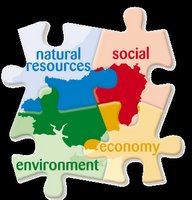Projets de développement durable / Sustainable development projects
An English post will follow
Le PNUD (Programme des Nations Unies pour le Développement), le FEM (Fond Environnemental Mondial) et le gouvernement tunisien travaillent  conjointement pour améliorer la gestion des problèmes environnementaux par les agences gouvernementales et non-gouvernementales. Ceci inclue l’identification et l’évaluation des contraintes d’application des conventions des Nations Unies et la préparation d'une stratégie nationale, l’augmentation de la sensibilisation et de la compréhension des causes et impacts des changements climatiques, le renforcement du potentiel scientifique et technique pour évaluer la consistance des ressources de production de nourriture et des ressources d'eau, et finalement le renforcement des capacités financières dans le domaine de la conservation énergétique. En un mot : l’objectif ultime c’est le développement durable.
conjointement pour améliorer la gestion des problèmes environnementaux par les agences gouvernementales et non-gouvernementales. Ceci inclue l’identification et l’évaluation des contraintes d’application des conventions des Nations Unies et la préparation d'une stratégie nationale, l’augmentation de la sensibilisation et de la compréhension des causes et impacts des changements climatiques, le renforcement du potentiel scientifique et technique pour évaluer la consistance des ressources de production de nourriture et des ressources d'eau, et finalement le renforcement des capacités financières dans le domaine de la conservation énergétique. En un mot : l’objectif ultime c’est le développement durable.
 conjointement pour améliorer la gestion des problèmes environnementaux par les agences gouvernementales et non-gouvernementales. Ceci inclue l’identification et l’évaluation des contraintes d’application des conventions des Nations Unies et la préparation d'une stratégie nationale, l’augmentation de la sensibilisation et de la compréhension des causes et impacts des changements climatiques, le renforcement du potentiel scientifique et technique pour évaluer la consistance des ressources de production de nourriture et des ressources d'eau, et finalement le renforcement des capacités financières dans le domaine de la conservation énergétique. En un mot : l’objectif ultime c’est le développement durable.
conjointement pour améliorer la gestion des problèmes environnementaux par les agences gouvernementales et non-gouvernementales. Ceci inclue l’identification et l’évaluation des contraintes d’application des conventions des Nations Unies et la préparation d'une stratégie nationale, l’augmentation de la sensibilisation et de la compréhension des causes et impacts des changements climatiques, le renforcement du potentiel scientifique et technique pour évaluer la consistance des ressources de production de nourriture et des ressources d'eau, et finalement le renforcement des capacités financières dans le domaine de la conservation énergétique. En un mot : l’objectif ultime c’est le développement durable. Portefeuille budgétaire pour la Tunisie
UNDP-GEF et Co-Financement: $117,965,800
UNDP et Co-Financement: $1,549,113
Total: $119,514,913
Tous les efforts ont été dirigés vers des stratégies de développement régional afin améliorer les conditions de vie des ménages tunisiens en facilitant l'accès aux services publics de base tels que l'eau potable, l'électrification, les services de santé et l'éducation. En 2002, cette stratégie a fourni l'eau potable à 93,6% de la population totale, et 82,6% dans les zones rurales. Mais les statistiques régionales indiquent de grandes disparités avec 10% de la population dans le nord-ouest et le centre n’ayant pas accès à l'eau potable.
Ayant comme objectif global de réduire à long terme la croissance des émissions de gaz à effet se serre (GEF) liées à la consommation énergétique de combustible fossile, le FEM soutient le gouvernement tunisien dans son engagement pour mettre en application un code d’efficacité optimale pour les bâtiments dans les secteurs résidentiels et commerciaux. Il vise également à réduire la croissance des émissions de GES à travers de la conception, l'exécution, la promotion et l'appui d'une énergie propre pour certains appareils électroménagers.
En conclusion, le PNUD, le FEM, et le gouvernement tunisien appuient tous les efforts favorisant une biodiversité axée sur une gestion efficace de la faune et la flore comme par exemple dans le parc national d’EL Feija.
---
UNDP (United Nations Development Program), GEF (Global Environmental Facility), and the Tunisian government are working to improve the capacity of governmental and non-governmental agencies to address pressing environmental concerns. This includes identifying and assessing capacity constraints in the implementation of UN environmental conventions and preparing a national strategy and an action plan, raising awareness and increasing the understanding of causes and impacts of climate change, enhancing scientific and technical capacity for assessing vulnerability of food production and water resources, and building national capacities in the field of financing of energy conservation. Put differently, we’re looking to enhance sustainable development.
Portfolio budget for Tunisia
UNDP-GEF and Co-Finance: $117,965,800
UNDP and Co-Finance: $1,549,113
Total: $119,514,913
Most efforts were deployed by adopting regional development strategies to improve the living conditions of Tunisian households through access to basic public services such as drinking water, electrification, health services and education. This strategy provided drinking water in 2002 to 93.6% of the total population, and 82.6% in rural areas. But regional statistics reveal notable disparities with 10% of the population in the Northwest and Centre West with no access to drinking water.
With the overall objective of reducing the long-term growth of GHG emissions related to consumption of fossil fuel energy in Tunisia, GEF is supporting the Tunisian government in its commitment to implement an optimal-efficiency building code for residential and commercial sectors. It also aims to reduce the growth of GHG emissions through the design, implementation, promotion and support of an optimized cold appliance energy labeling and minimum energy performance standards program.
Finally, UNDP, GEF, and the Tunisian government are supporting biodiversity efforts focused on enhancing livelihoods of communities and the environment in the surroundings of El Feija national park, removing barriers to genetic erosion of date palm in the Maghreb region,and contributing to the conservation and sustainable use of wetland biodiversity in the Mediterranean.





<< Home